Series of Theoretical–Practical Workshops on Parasitological Diagnosis in the Laboratory of Hospital Escuela – Workshop 1, March – May 2025
Introduction
The Honduran Parasitology Association (AHPA), together with the Antonio Vidal Institute (IAV) and the Parasitology Service of Hospital Escuela, promotes this series of workshops as part of its commitment to strengthening clinical diagnosis of parasitic diseases. Within the framework of The Global Health Network Latin America and the Caribbean (TGHN LAC) Consortium, these activities aim to improve the diagnostic capacity of the laboratory personnel of Hospital Escuela and related public health institutions through theoretical and practical training in medical parasitology.
General Objective
To strengthen the diagnosis of intestinal parasitoses caused by amoebas, protozoa of the Apicomplexa phylum, helminths, and to reinforce the diagnosis of malaria among the laboratory personnel of Hospital Escuela and other public health institutions.
Expected Results
This workshop series seeks to generate a positive change in diagnostic capacity through:
- Theoretical and practical training of laboratory personnel.
- Implementation of standardized parasitological diagnostic methods.
- Promotion of collaboration among institutions and the use of continuous learning platforms such as TGHN.
General Details
📅 Duration Workshop 1: March – May 2025
📍 Modality: In-person
🏥 Participating institutions: AHPA, Antonio Vidal Institute, and Hospital Escuela
⏰ Session schedule: Thursdays, from 1:00 p.m. to 5:00 p.m.
📌 Venue: “Rina Girard de Kaminsky” Parasitology Service, Hospital Escuela, Tegucigalpa
Workshop Components
🔬 1. Parasitological Diagnostic Guide
Organized by parasite type, it includes algorithms for the morphological identification of amoebas, flagellates, helminths, and protozoa of the Apicomplexa group. It also addresses clinical, epidemiological, and laboratory aspects for diagnostic approaches.
📁 2. Structured Laboratory Practices
Each session includes practical activities aimed at developing skills in microscope use, preparation and reading of stained slides (ARM, trichrome, and Giemsa), and analysis of preserved and unpreserved samples.
📝 3. Diagnostic Evaluation and Continuous Improvement
Pre- and post-workshop tests are applied to measure learning progress. Participants also provide qualitative feedback to continuously improve the training process.
🎓 4. Certification
Participants achieving a final grade ≥ 80% will receive a certificate of completion. Those who do not reach that score will receive a certificate of participation.
Resources
Workshop participants will have access to the following support resources to facilitate learning and documentation of progress:
📘 Printed Materials
- Guide to Prevalent Parasitic Diseases in Honduras (2nd ed., 2023)
- Algorithms and diagrams for parasitological identification
🔬 Laboratory Resources
- Individual microscope per participant
- Stained slides (ARM, trichrome, Giemsa)
- Preserved and unpreserved stool samples
🌐 TGHN Platform
📄 Evaluation and Certification
- Pre- and post-workshop tests
- Certificates of completion (grade ≥ 80%) or participation
Workshop 1. Parasitological Diagnosis
Session 1.1 Diagnosis of Intestinal Apicomplexa (Cryptosporidium spp., Cyclospora cayetanensis, and Cystoisospora belli)
📅 March 13, 2025
During this first workshop session, a diagnostic pre-test was conducted to assess participants’ baseline knowledge. Subsequently, The Global Health Network (TGHN) platform was introduced, and participants were encouraged to enroll in the Basic Malaria Microscopy course as a complementary learning resource.
In the theoretical segment, key topics were addressed regarding the biology, epidemiology, clinical presentation, and diagnostic methods of protozoa belonging to the Apicomplexa phylum. Participants were then divided into two groups for laboratory practice:
Group 1: Application of the modified acid-fast (ARM) staining technique.
Group 2: Microscopic observation of oocysts stained using ARM.
This dynamic provided participants with an initial practical approach to the diagnostic morphology of intestinal parasites of the Apicomplexa group.
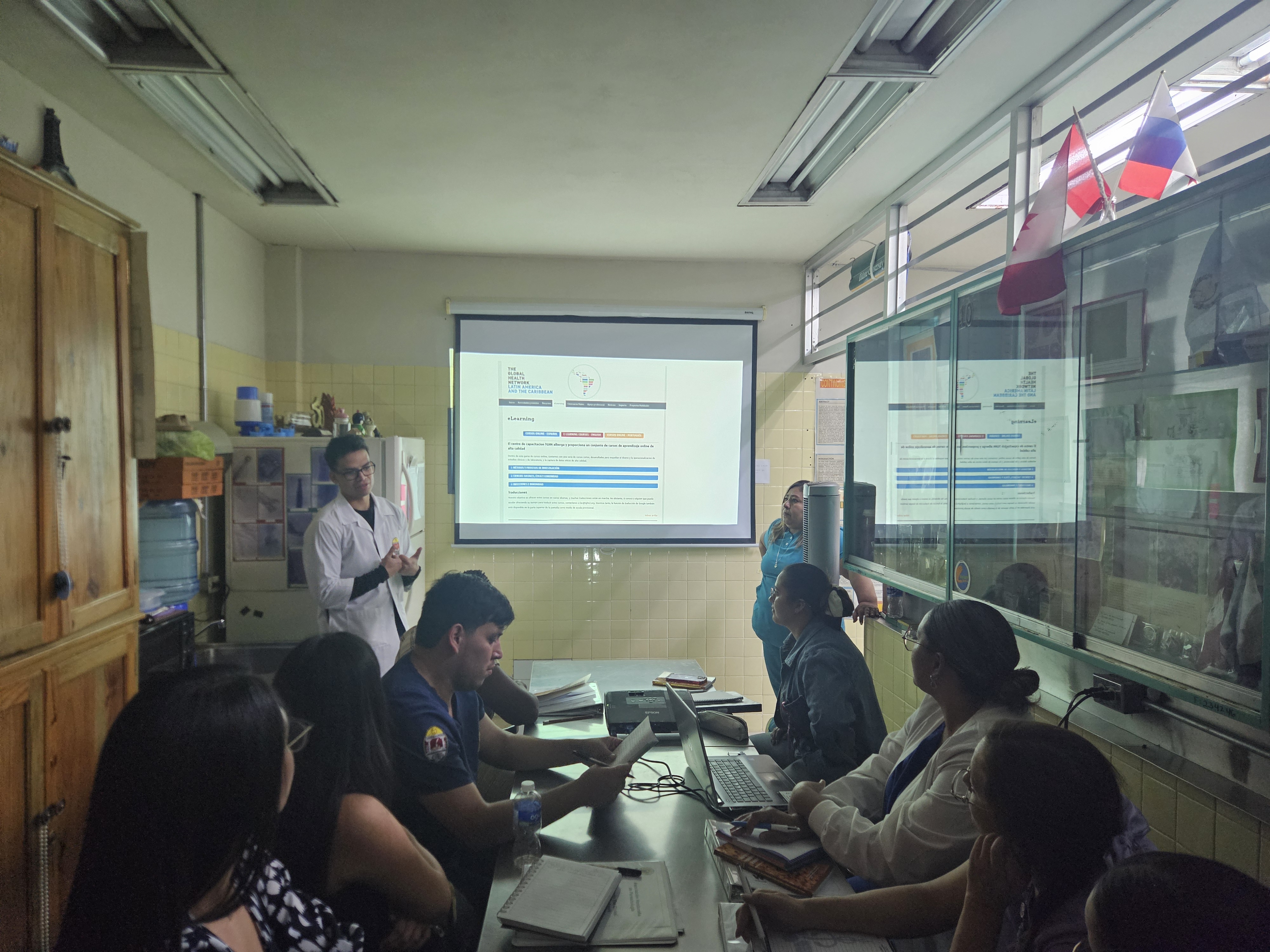
Dr. Héctor Cruz exploring the TGHN LAC Hub and launching the series of parasitological diagnosis workshops.
Session 1.2 Intestinal Apicomplexa Diagnosis – Continuation
📅 March 20, 2025
During this second session, theoretical concepts were reinforced through the projection of diagnostic images of oocysts, promoting interactive discussion among participants.
The rotation of working groups ensured that all participants completed both laboratory practices:
- ARM staining practice.
- Microscopic observation of stained oocysts.
At the end of the session, a final knowledge assessment was conducted to measure progress achieved during the sessions.
📊 General session results:
- Participants who completed: 12 of 15 registered
- Participants who passed (grade ≥80%): 8
- Average pre-test score: 13%
- Average post-test score: 79%
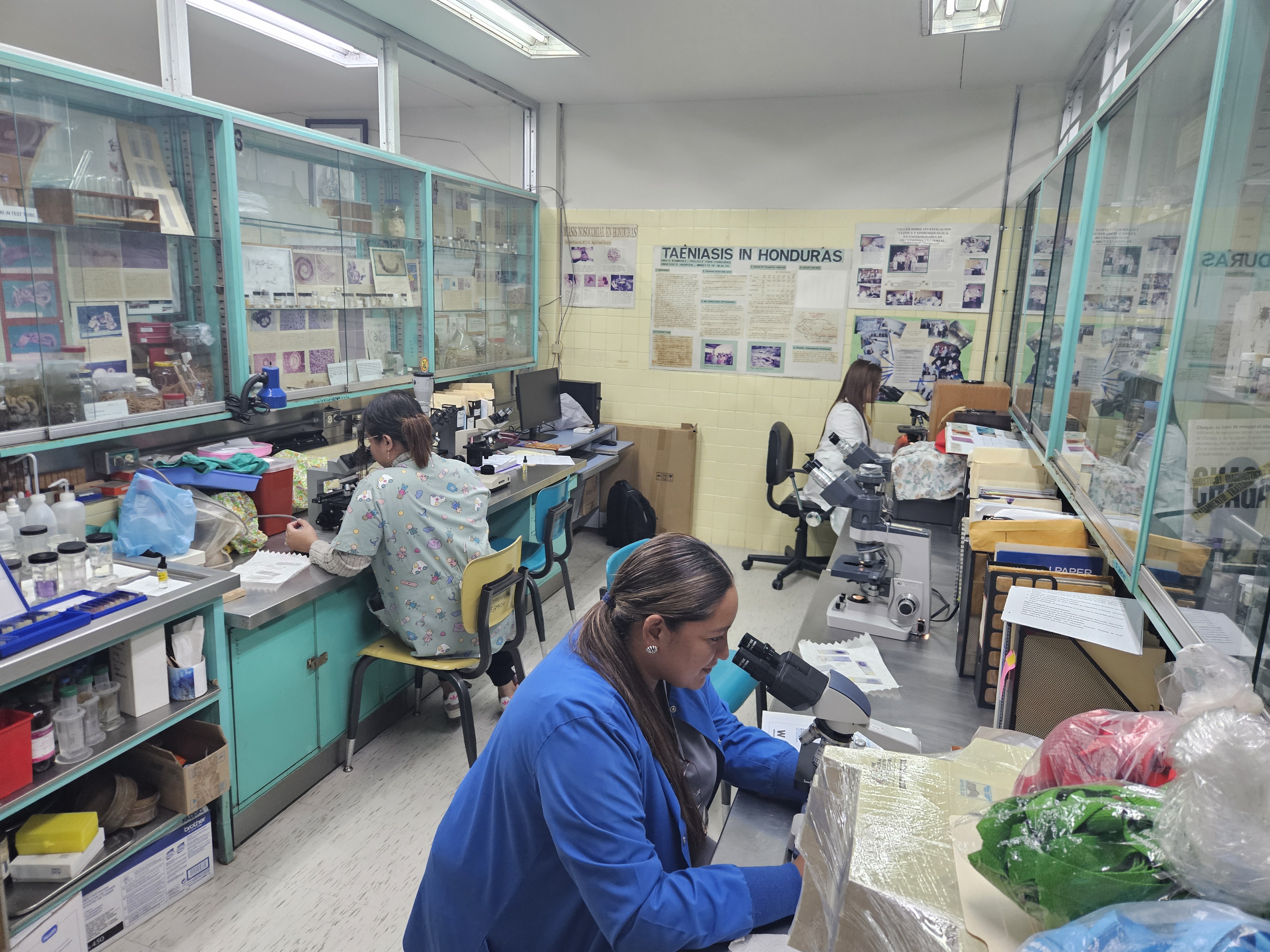
Workshop participants performing microscopic practices with stained slides during the session at the Parasitology Service of Hospital Escuela, Honduras.
Session 2.1 Intestinal Amoebas and Flagellates
📅 March 27, 2025
The session began with a diagnostic pre-test to assess participants’ initial knowledge level. The use of the TGHN platform was again promoted, emphasizing the importance of the Basic Malaria Microscopy course.
Next, a theoretical discussion focused on the biology, epidemiology, clinical presentation, and diagnostic methods of intestinal amoebas and flagellates. The first laboratory practice followed, consisting of the microscopic observation of trichrome-stained slides to identify and differentiate the nuclear structures of various parasitic species.
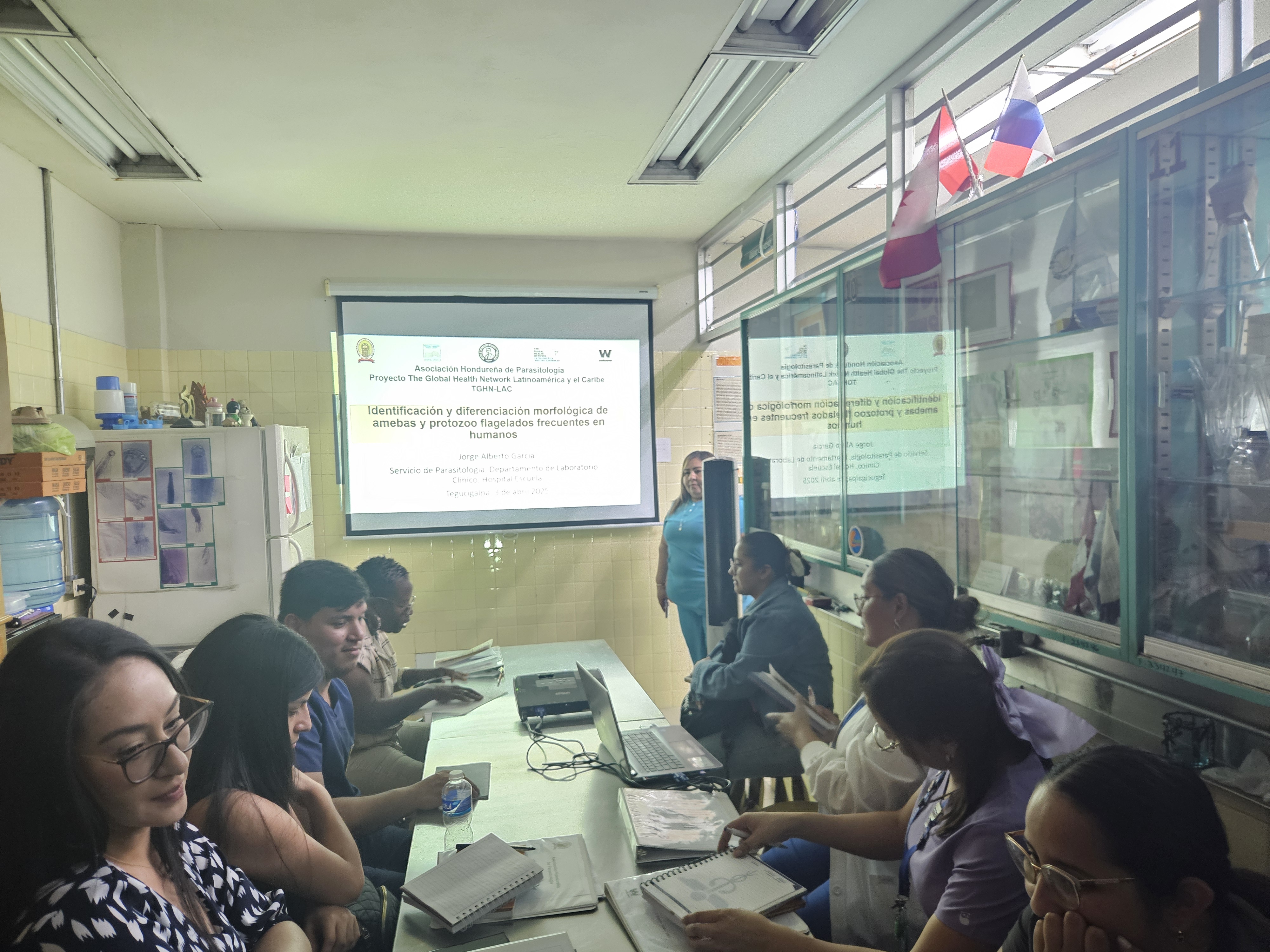
Workshop participants during the theoretical discussion on the morphological differentiation of amoebas and flagellates at the Parasitology Service of Hospital Escuela, Honduras.
Session 2.2 Intestinal Amoebas and Flagellates
📅 April 3, 2025
This second session began with continued promotion of the TGHN platform, followed by a brief theoretical discussion introducing hematophagous and non-hematophagous amoeba trophozoites.
The second laboratory practice involved microscopic observation of stool samples preserved in 10% formalin and unpreserved samples from daily diagnostic routines. The goal was to identify morphological differences in intestinal amoebas and flagellates depending on sample preservation.
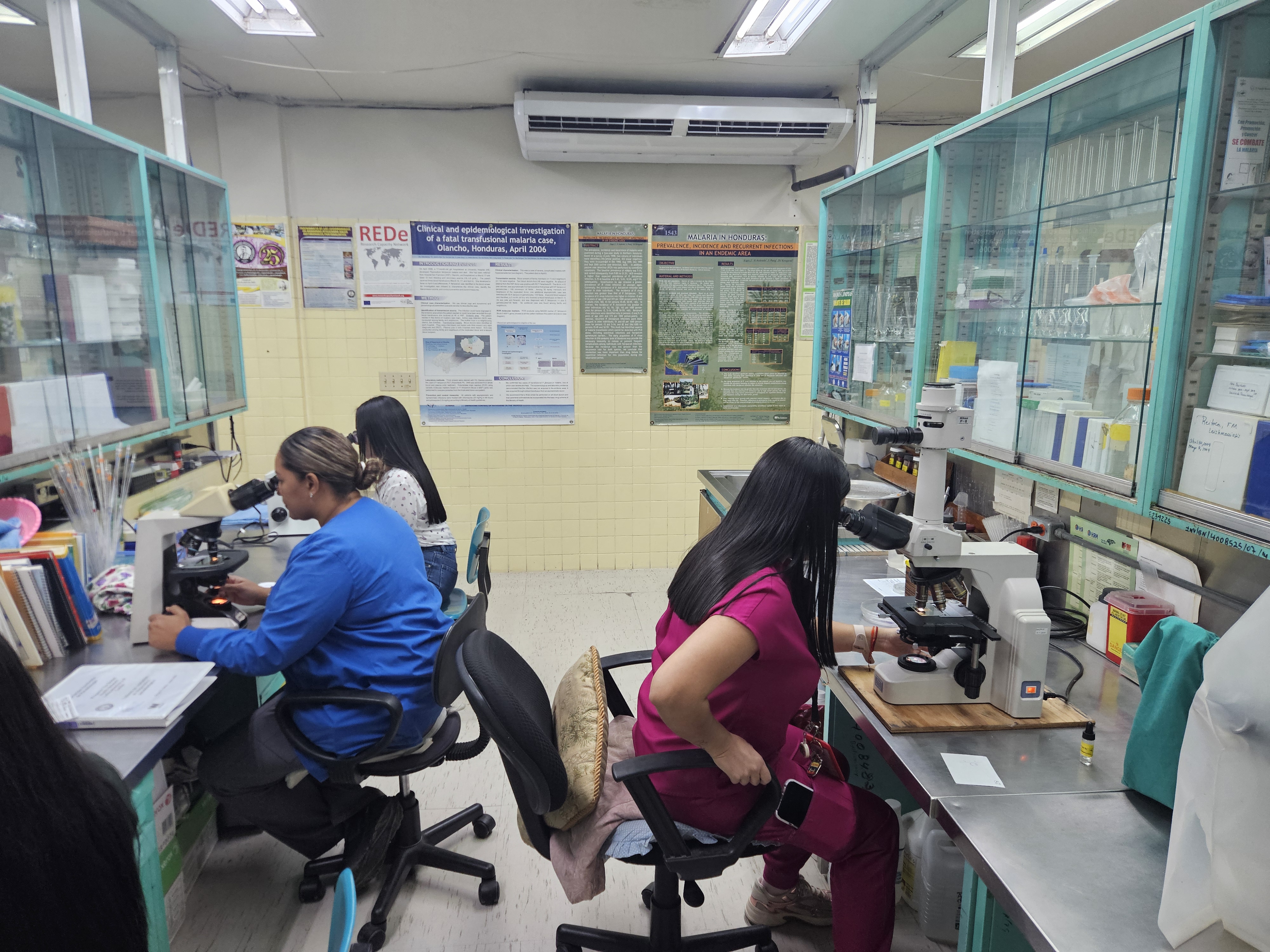
Laboratory practice during microscopic observation of preserved and unpreserved samples at the Parasitology Service of Hospital Escuela, Honduras.
Session 2.3 Intestinal Amoebas and Flagellates
📅 April 10, 2025
The third and final session of the module included a brief theoretical review and an individual image recognition exercise focused on the developmental stages of amoebas and flagellates.
Participants reinforced diagnostic skills through microscopic observation of new preserved and unpreserved stool samples. The module concluded with a post-workshop diagnostic evaluation to measure learning progress.
📊 General session results:
- Participants who completed: 10 of 15 registered
- Participants who passed (grade ≥80%): 4
- Average pre-test score: 38%
- Average post-test score: 62%
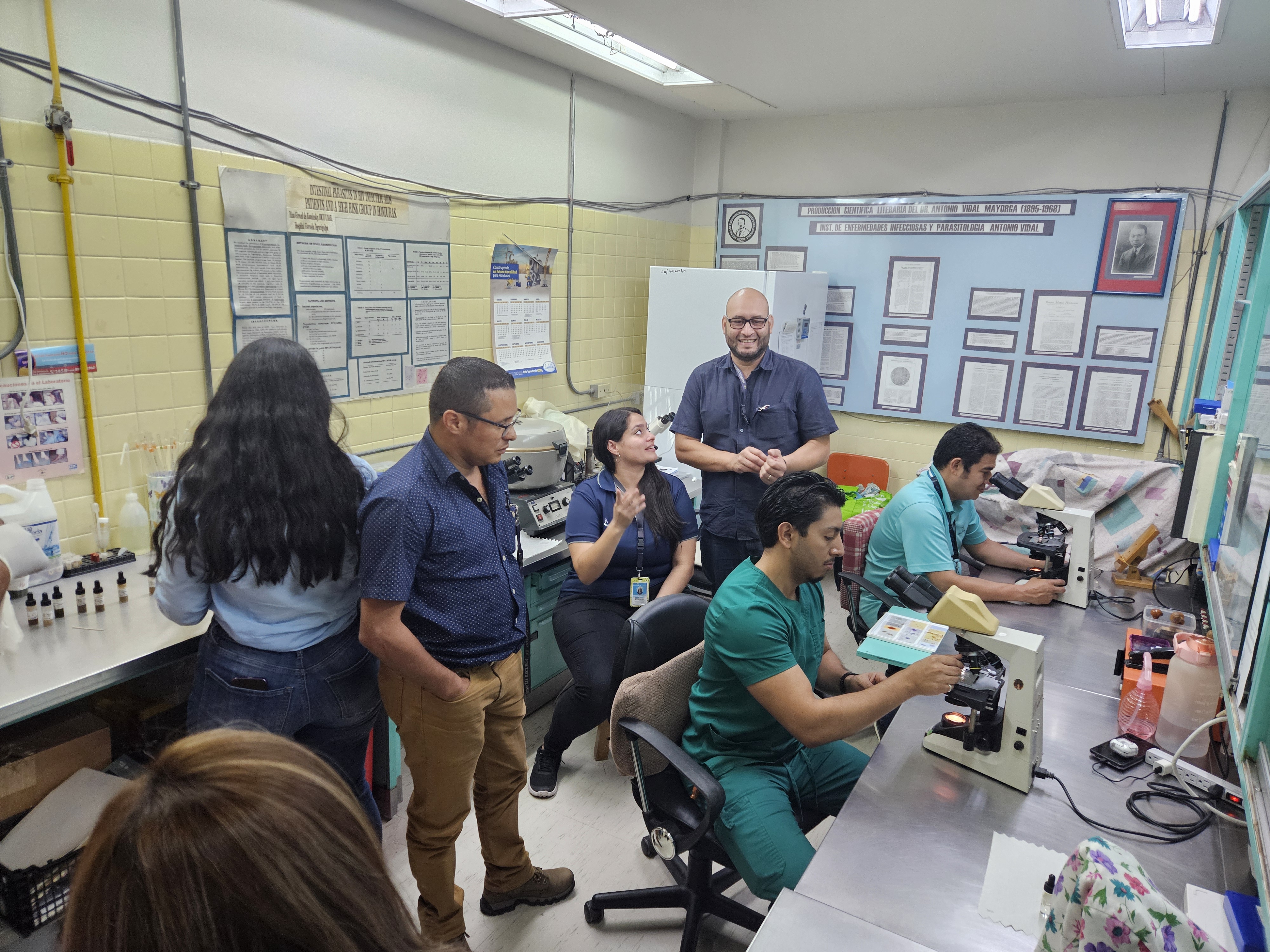
Workshop participants during the morphological identification practice of intestinal amoebas and flagellates, accompanied by the Parasitology Service team of Hospital Escuela, Honduras.
Session 2.4 Intestinal Helminths (Soil-Transmitted Nematodes and Strongyloides stercoralis)
Dates: April 24 and 30, 2025
This session aimed to strengthen the morphological diagnosis of intestinal helminths by integrating theory and laboratory practice. It began with a theoretical review on the biology, epidemiology, clinical presentation, and diagnostic methods for soil-transmitted nematodes, including Ascaris lumbricoides, Trichuris trichiura, and Ancylostoma/Necator spp.. Participants then performed laboratory practices using preserved stool samples (10% formalin) via direct method and microscopic egg observation, as well as a demonstration of the Kato-Katz technique.
The second day focused on Strongyloides stercoralis diagnosis, emphasizing its life cycle, clinical features, and parasitological methods. The modified Baermann technique was applied for larval isolation from fresh samples, alongside observation of preserved samples containing rhabditiform and filariform larvae. The TGHN platform was promoted as a complementary learning tool, and printed materials were distributed for reinforcement.

Dr. Héctor Cruz guiding the practical session on intestinal helminths, focused on diagnostic techniques and microscopic observation.
Session 2.5 Malaria (Plasmodium vivax and Plasmodium falciparum)
Dates: May 7, 15, and 22, 2025
First session – May 7: The day began with a theoretical review on the biology, clinical presentation, and life cycle of Plasmodium vivax and P. falciparum, emphasizing timely and differential diagnosis. Two groups performed laboratory practices: one focused on morphological recognition on Giemsa-stained slides (thick and thin smears), and the other on slide preparation, staining, and observation. The Basic Malaria Microscopy Course on the TGHN platform was also promoted.
Second session – May 15: Participants engaged in an interactive image-recognition exercise identifying parasite species and stages, guided by facilitators. Groups rotated to ensure all participants practiced both techniques, reinforcing collaborative learning.
Third session – May 22: The day began with a general review followed by a discussion on parasite density estimation and its clinical relevance. The practical component focused on calculating parasite density using pre-stained positive slides. A final evaluation was conducted to measure individual progress, and support materials were provided for further study.
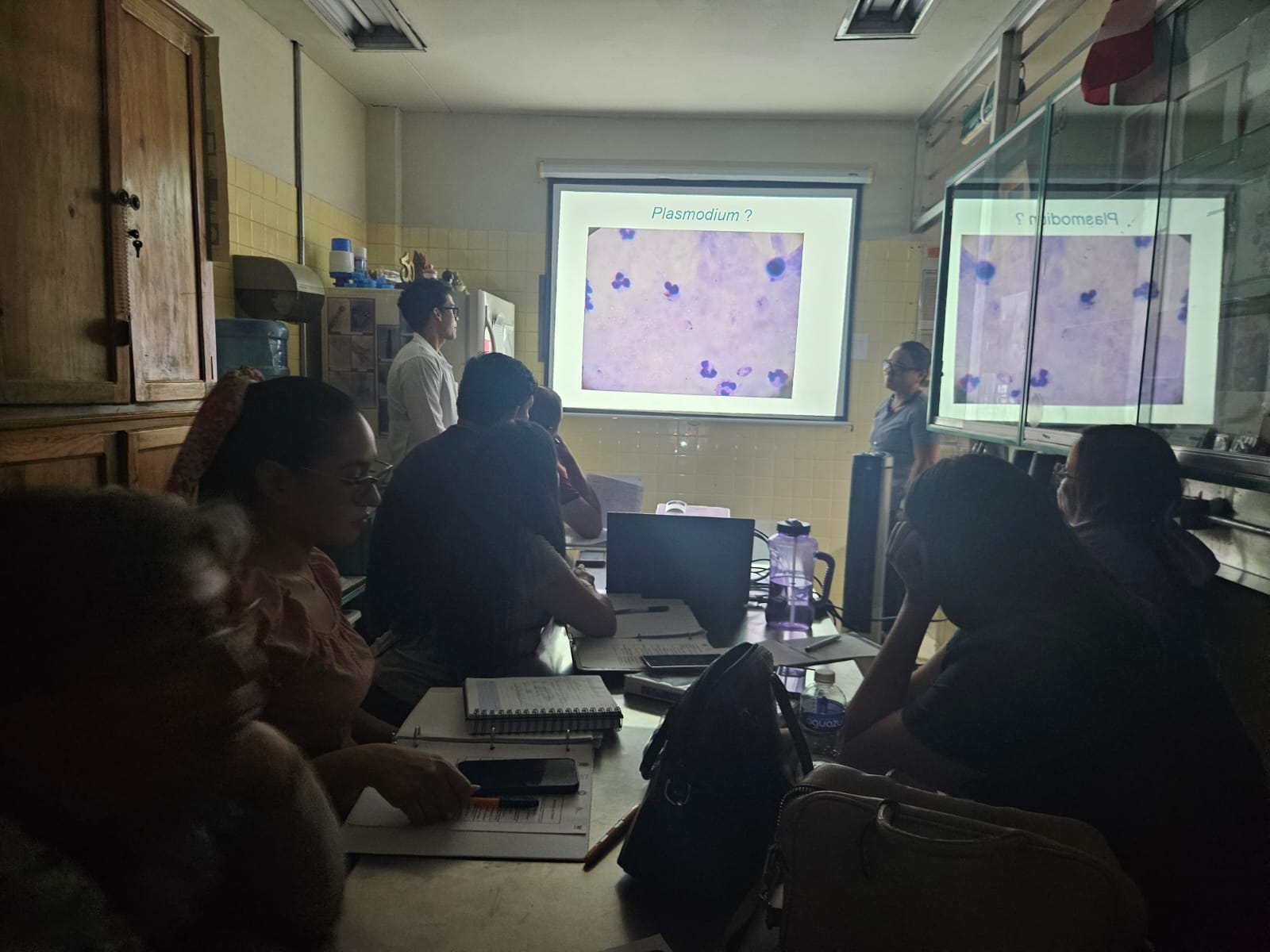
Dr. Héctor Cruz leading an interactive exercise during the second malaria session, guiding participants in morphological identification of Plasmodium from projected images.
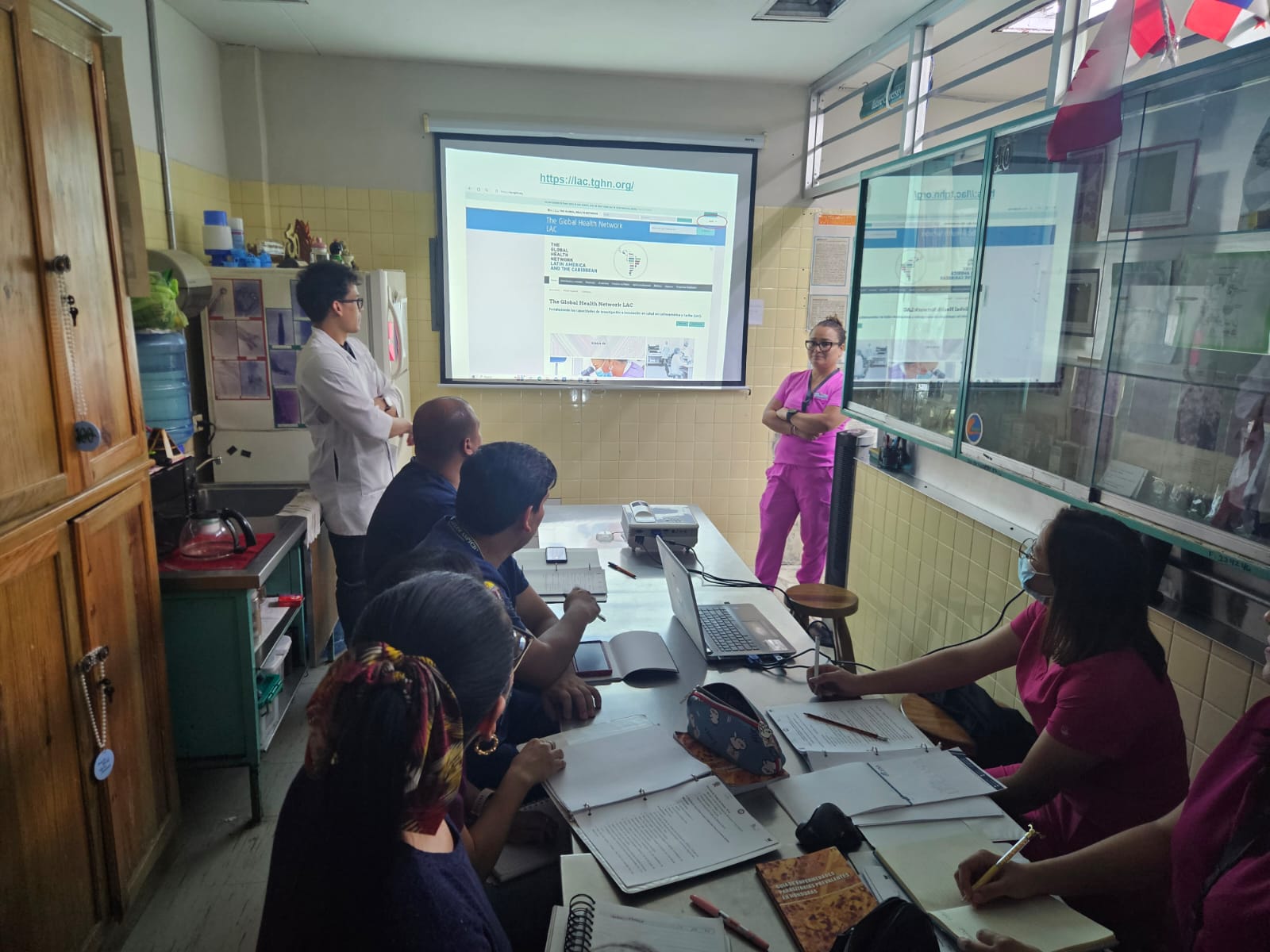
The facilitation team promoting the use of the TGHN LAC platform as a complementary tool to strengthen laboratory diagnostic capacity.
Support the community
Thank you for visiting The Global Health Network, please take a moment to read this important message. As you know, our aim is to enable equity in access to research knowledge and this is successfully delivering support and training to 1000’s of research teams all over the world. But we need your support!. If you have benefited from this research skills and knowledge sharing facility, please help us sustain this remarkable and unique provision of information for those who could otherwise not access such support and training. We would be really grateful if you could make a donation or ask your employer or organisation to contribute to the costs of maintaining this platform and the generation of new contents for all users. Just a small contribution from everyone who can afford to pay would keep this available for those who cannot. Thank you, we really appreciate your part in this community effort to better equity in global health research.
